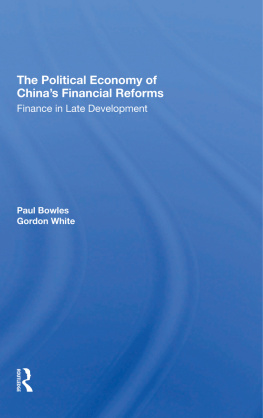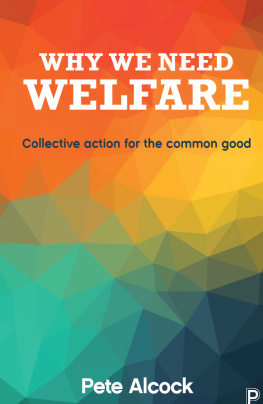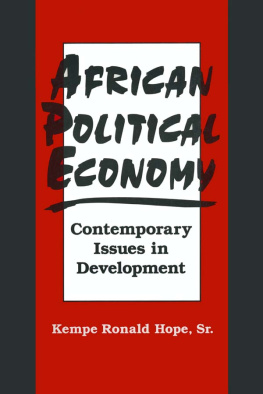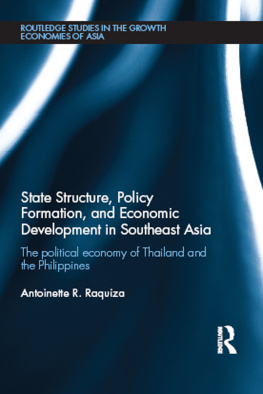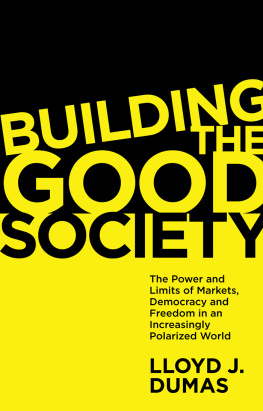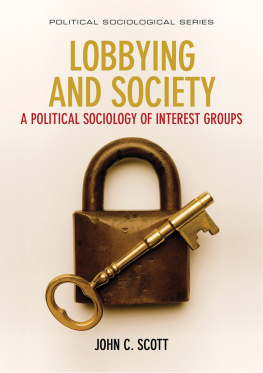THE POLITICAL ECONOMY OF COLLECTIVE ACTION, INEQUALITY, AND DEVELOPMENT
William D. Ferguson
Stanford University Press
Stanford, California
Stanford University Press
Stanford, California
2020 by the Board of Trustees of the Leland Stanford Junior University. All rights reserved.
No part of this book may be reproduced or transmitted in any form or by any means, electronic or mechanical, including photocopying and recording, or in any information storage or retrieval system without the prior written permission of Stanford University Press.
Printed in the United States of America on acid-free, archival-quality paper
Library of Congress Cataloging-in-Publication Data
Names: Ferguson, William D., author.
Title: The political economy of collective action, inequality, and development / William D. Ferguson.
Description: Stanford, California : Stanford University Press, [2020] | Includes bibliographical references and index.
Identifiers: LCCN 2019049300 (print) | LCCN 2019049301 (ebook) | ISBN 9781503604612 (cloth) | ISBN 9781503611979 (ebook)
Subjects: LCSH: EqualityEconomic aspects. | Economic development. | Political development.
Classification: LCC HM821 .F47 2020 (print) | LCC HM821 (ebook) | DDC 320.01/1dc23
LC record available at https://lccn.loc.gov/2019049300
LC ebook record available at https://lccn.loc.gov/2019049301
Cover image: iStock
Cover design: Rob Ehle
Typeset by Newgen in 10/14 Minion Regular
Dedicated to my wife, Claudia Beckwith; my children, Caitlin and Taylor Beckwith-Ferguson; and to the memory of my parents, Audrey I. and Allen R. Ferguson.
Contents
Preface
Sapiens and Neanderthals
Thanks to their ability to invent fiction, Sapiens create more and more complex games, which each generation develops and elaborates even further.
Yuval Noah Harari, Sapiens: A Brief History of Humankind (2015)
According to historian Yuval Noah Harari (2015), from about 70,000 to 30,000 years ago, Homo sapiens vied with Homo neanderthalensis for dominance in areas of Europe and the Middle East. The Neanderthals were larger, stronger, better adapted to cold climates, and had larger brains. They also used tools and knew how to care for their sick. Neanderthals could dominate in one-on-one combat. Yet, Sapiens ultimately prevailed. Indeed, they exterminated the Neanderthals. Sapiens triumphed because they had developed collaborative cognitive abilities that Neanderthals simply lacked. Specifically, Sapiens developed the ability to tell stories, not just about lions in bushes, but also about each otherthat is, to gossip. This capability permitted forms of cooperation that Neanderthals could not achieve; it fostered organizing cooperative activity among individuals, resolving some collective-action problems. Concurrently, Sapiens developed the ability to talk about things not present, things they have never seen, touched, or smelled.... Only Homo sapiens can speak about things that dont really exist, and believe six impossible things before breakfast (Ibid., 24). Sapiens learned to share legends, myths, gods, and other abstract concepts (relevant later on) like nationhood. They shared stories that could forge common purpose, identity, and ideologies: Fiction has enabled us to not merely imagine things, but to do so collectively (Ibid., 25; emphasis in original). Collective storytelling facilitated rapid social adaptation to changing environments. To alter group behavior, Sapiens could change shared storiesa process much faster than genetic evolution. This cognitive revolution ushered in the triumph of Homo sapiens over Homo neanderthalensis.
Before 10,000 years ago, Sapiens spread across the planet and survived as foragers. In terms of leisure and, arguably, quality of work, they achieved relatively high standards of living. Normally, work did not exceed 3540 hours per week, and it involved multiple stimulating tasks. Foragers ate varied and balanced diets and exercised substantially. Children who survived their first few years had good prospects of living at least until age 60, sometimes age 80. With multiple sources of food, deprivation of one type rarely led to starvation.
Starting about 9,500 years ago, however, Sapiens began to develop agriculture. The agricultural revolution unfolded over the next 7,000 years, extending across the globe via simultaneous invention. Cultivating crops was not the idea of a single person or group but rather an adaptation to roughly similar environmental conditions encountered around the globe. The agricultural revolution, which Harari calls historys greatest fraud, vastly improved food productivity, permitting substantial population growth. It also brought more labor, more disease (transmitted between humans and domesticated animals), lower life expectancies, additional reasons for territorial conflict, graver consequences to losing such conflictssuch as starvation, which might also arise from drought or insectsand dimensions of inequality and social hierarchy that Sapiens had not previously experienced. Whereas this shift in production benefited the species as a whole (the gene pool), most individualsexcept those at the top of the hierarchyexperienced more deprivation. Adaptive human activitysensible in multiple relevant contextsfostered more work for mere survival, more disease, and so on. From the viewpoint of the peasant masses, the agricultural revolution introduced many new collective-action problems. How might they work together to escape toil, disease, instances of starvation, and the often cruel authority of those at the top of social hierarchies?
Acknowledgments
I wrote the bulk of The Political Economy of Collective Action, Inequality, and Development during a series of academic visits, most of which occurred during my 201718 sabbatical. The following institutions provided office support with extensive opportunities to interact with scholars, attend and present my work at seminars, workshops, and various lectures, while writing the basic manuscript: The Effective States and Inclusive Development Research Centre (ESID) of the Global Development Institute, University of Manchester; the Institute for New Economic Thinking (INET) at the Oxford Martin School, University of Oxford; the Political Science Department and Amsterdam Institute for Social Science Research (AISSR), University of Amsterdam; the Berlin WZB Social Science Center; and the Economics Department at University College London.
I want to thank the following individuals for arranging these visits: Kunal Sen, Julia Brunt, and Kat Bethell at Manchesters ESID; Eric Beinhocker and Susan Mousley at INET Oxford; Brian Burgoon and Geoffrey Underhill at the University of Amsterdam; Steffen Huck at WBZ Berlin; and Wendy Carlin and Frank Witte at University College London.
I offer special thanks to Brian Levy and David Booth for their support and comments and for putting me in contact with ESIDs Kunal Sen and Sam Hickey. A special thanks also goes to Rob Axtell, who has consistently supported my work, offered me comments, and who introduced me to Eric Beinhocker.
The ESID visit and workshops contributed decisively to my understanding of the concept of political settlements. I especially thank Tim Kelsall and Matthias vom Hau, whose basic approach to political settlements underlies mine. Brian Levy and David Booth introduced me to the concept. I benefited substantially from conversations, workshops, and seminar sessions with scholars including Pritish Behuria, Abhishek Chakravarty, Ralitza Dimova, Sam Hickey, David Hulme, David Jackman, Thomas Lavers, Diana Mitlin, Dilip Mookherjee, Kate Pruce, Antonio Savoia, Nicolai Schulz, Kunal Sen, Maya Tudor, Matthias vom Hau, and Pablo Yanguas. I thank Tim Kelsall and Kunal Sen for their comments on several chapters. ESID also offered me the honor of delivering the 2017 Adrian Leftwich Memorial Lecture, about my book, on November 29.


